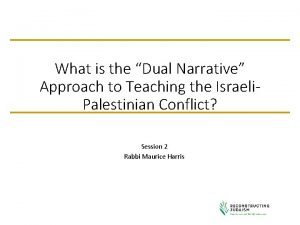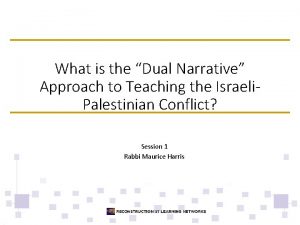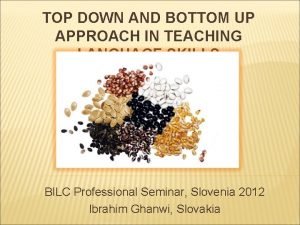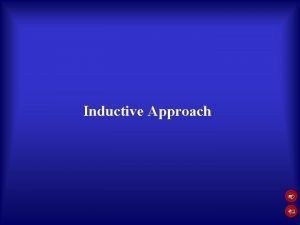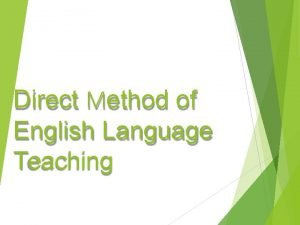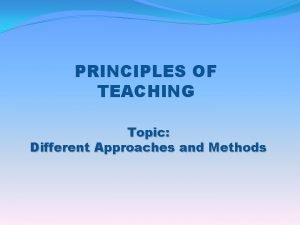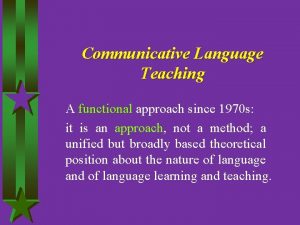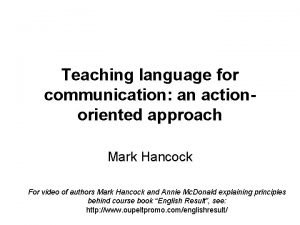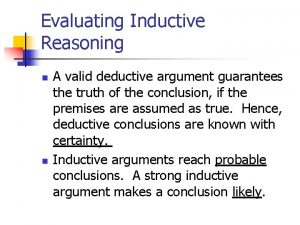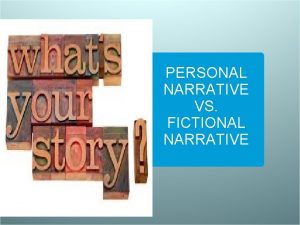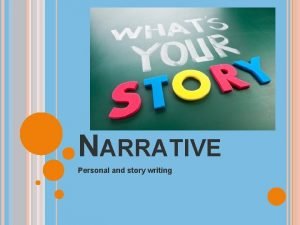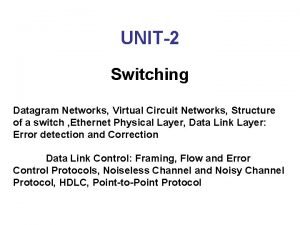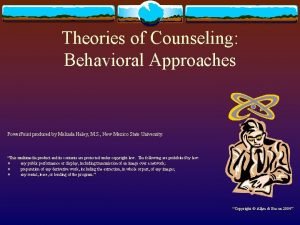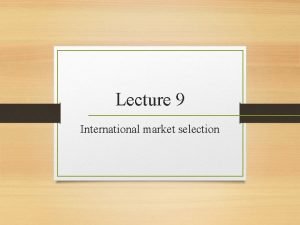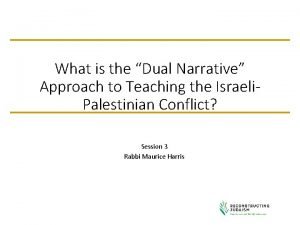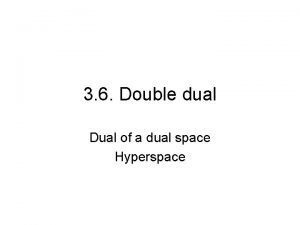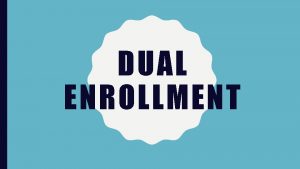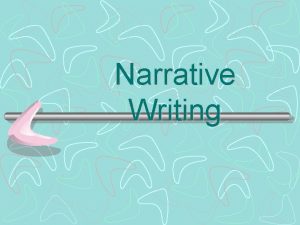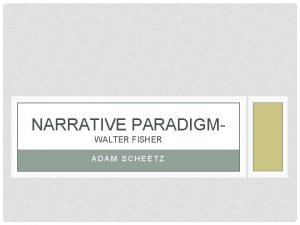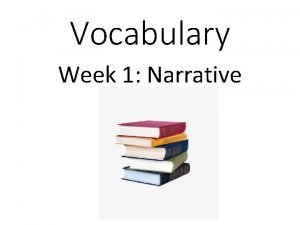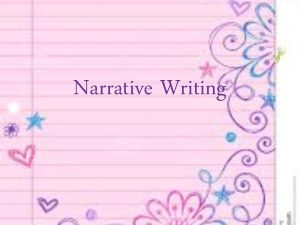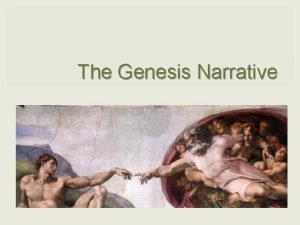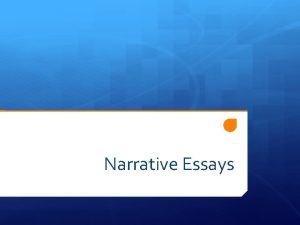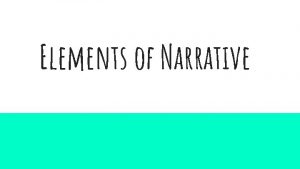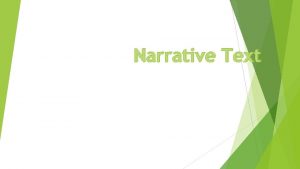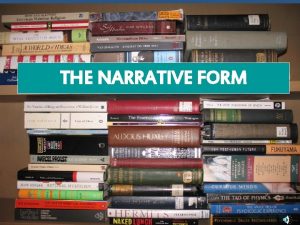What is the Dual Narrative Approach to Teaching



















- Slides: 19

What is the “Dual Narrative” Approach to Teaching the Israeli. Palestinian Conflict? Session 1 Rabbi Maurice Harris

Opening Kavannah https: //ritualwell. org/ritual/beyond-stones-hearts-prayer-peace-land-israel 2

Goals…of the network To become familiar with key elements of the dominant narratives in both Palestinian and Israeli societies (and their respective supporters). Or at least, to learn where to find good resources for same. To imagine how you might plan programs in your communities based on a dual-narrative framework. This framework prioritizes the stories that Israelis and Palestinians tell themselves and the world about themselves and the conflict. To share experiences, information, resources, and ideas with each other. To form relationships of mutual support around this topic. 3

Today’s Session in a Nutshell 1. Who is here and what’s most important to you? 2. Examples of “core narratives”. 3. Safety & Risk: Structural Choices for Planning Events 4. Preview of next sessions. 4

Who are you, what brought you here, and what’s important? 5

Two Core Narratives: Israeli For over a thousand years, the Land of Israel was the homeland of our ancestors. We were forced to leave it by violent means, not by choice. We never forgot Zion and Jerusalem, and for almost two thousand years we prayed for our return. We survived massacre and exile. Wherever we lived around the globe, or even when some of us were permitted to live in Eretz Yisrael, we always lived under Christian or Islamic rule, and our safety always depended on the mood of the leaders of the moment. We were nowhere sovereign, and time again we were scapegoated and thrown out of countless lands. When modern times arrived, we hoped Enlightenment values might end the precariousness of our situation. But the promise of these ideals never was sustained. Meanwhile, in Russia and eastern Europe, pogroms terrorized, murdered, and displaced masses of Jews. Blood libels, massacres, and forced second class status also struck Jewish communities in the Middle East and North Africa. By the middle of the 20 th century, the Jews of Europe were being systematically killed, with the public support of Palestinian leaders like Haj Amin al-Husseini. Zionism was our national liberation movement. We came wave after wave from distant shores to our ancestral homeland. We purchased land, drained swamps, planted orange groves, formed labor unions, and revived our ancient language – at first under the Ottomans, then the British. We broke bread with our Arab neighbors and with world leaders, seeking diplomatic pathways forward, to build a state for our people and support the Arab peoples to achieve independence throughout the region too. When we finally sought to declare our independence, we accepted a partition of 6

Two Core Narratives: Israeli the land, showing our willingness to share. We created a democratic and Jewish state, where Arab-Israelis have the vote and political parties, and a higher standard of living than much of the Arab world. Despite all this, the Arabs rejected us as if we never had any connection to this place. They call us colonialists, as if we have no roots here at all, as if we were some kind of invasive species, when the world knows this land was the birthplace of our people! They refused all compromises, and instead combined their armies to invade and destroy us. But though they outnumbered us, we were determined – not this time. We won our independence, and they’ve been jealous ever since. If they would have accepted our right to a state on some portion of our own historic homeland during the past 100 years, we’d have compromised generously. We’d be living in two states side-by-side today. But they’re blinded by their determination to have it all, and they’ll never compromise. And the religious fanatics among them would see us all exterminated. We are called bullies, while they incite and teach children to hate us. We are called oppressors, while the UN passes resolutions denying our connection to Jerusalem and ignoring the daily calls for our death in dozens of Islamic media outlets. Until they accept our right to exist as a Jewish state, we’ll do whatever we have to in order to defend ourselves. 7

Two Core Narratives: Palestinian For many centuries, Palestinian Arabs lived, built, farmed, married, raised children, and died in this land. Crusaders and Ottomans came and went, but our ancestors established thousands of villages here, welcoming pilgrims of all three religions of Abraham. As the 19 th century ended and the 20 th began, foreign colonial powers sought control over our lands. After the Turks it was the British and French, seeking oil dominance. The colonial powers recruited young Arabs to fight for them when it suited their purposes, in exchange for promises of full independence throughout all Arab lands. These were all broken promises, like the ones the US made to the American Indians. When the Zionists began coming in larger numbers, they made it clear their goal was to uproot us and build a European colonial outpost, without our consultation. Herzl wrote, “We must expropriate gently the private property [and] spirit the penniless population across the border. ” The Zionists formed armed groups, prepared for a war of expulsion against us, and made common cause with the British colonialists. In the 20 s and 30 s, together they crushed our street protests and expelled our leaders. They proposed plan after plan to take most of our historic homeland from us, each time demanding that we assent to our own dispossession. Each time we said no, but the notion of respecting the consent of the governed didn’t apply to Arabs. Meanwhile the Zionists and the Europeans denigrated our culture and denied our existence in communities throughout this land. They claimed the land was empty, and that they made the desert bloom, as if we were hopeless children who hadn’t raised generations of 8

Two Core Narratives: Palestinian children here. In 1948, they inflicted the Nakba upon us – the ethnic cleansing of over 700 villages. After the war, they violated UN resolution 194, establishing the right of return of all dispossessed Palestinians, and they continue to disregard 194 to this day. But our families, in refugee camps and in cities throughout our diaspora, still have the very keys to the homes they demolished! Time and again, over the last 70 years, they have launched wars of aggression – in ‘ 56 along with the English and French; in ‘ 67 to expand their territory and take over al-Quds, in ‘ 82 to bomb our refugees in Lebanese camps. Since ‘ 67 they’ve expanded their settlements non-stop, and imposed a never-ending military Occupation upon us, forcing us to pass through checkpoints just to visit our relatives or go to our jobs, and harassing our youth with frequent night raids, arrests, military kangaroo courts, and torture. Today we live under Israeli Apartheid – different laws cage our people in walled off cantons while Jewish settlers enjoy the full rights of Israeli citizens. But we are not discouraged. No injustice lasts forever. We continue to build our resistance, and one day we will liberate our lands and regain our rights. Our struggle is intersectional, connected with the liberation movements of all oppressed peoples, and in this interconnected online era, people who believe in justice all over the world are joining in the struggle for our liberation. 9

Narratives… 1. …are as real as the other elements of a conflict. 2. …invite and discourage. 3. …reveal and obscure, include and exclude. 4. …can be open or closed, to varying degrees. 5. …can tell the truth and lie, even at the same time.

Core Narratives with Maps: Palestinian Narrative 11

Core Narratives with Maps: Israeli 12

Suggestions 1. Advanced registrations plus sign-off on civility covenant 2. To complete registration, must respond to a few questions (see example) 3. Opening / closing ritual moment 4. For public events: a. civility pledge b. questions on notecards c. taking care with publicity choices

Suggestions 5. Facilitator / speaker identifies own lenses (see example) Your Advice / Suggestions:

Registration questions? In order to help the facilitator create a constructive learning environment for everyone, please respond to the following questions. Your responses will not be shared with anyone else in the class. 1. What hopes do you bring to this class? 2. What concerns or worries do you bring to this class? 3. What, if anything, do you want to know about the instructor? 4. Please tell us a little about your experiences and perspectives on this subject?

Who is the facilitator? I’m a “progressive rabbi” with ties to the Israeli peace movement. I have close family in Israel and partly grew up there. I’ve formed important friendships with Palestinians living in the West Bank and have come to care deeply about them. So on a gut level, Israel feels like family to me, and Palestinians feel like people I have deep feelings for. I respect, admire, and get frustrated by them both.

Code of Civility • Respectful disagreement • Respectful questioning • For people who tend to like to share a lot, making sure that you leave room for others to participate • Refraining from language that is bigoted or derogatory • Assuming the best intentions, not the worst, if someone does say something that causes pain or offense (“ouch”)

Code of Civility • Allowing the use of politicized language while holding one another to a mutually agreed expectation to avoid bigoted or derogatory language. (This can be tricky. ) • This is a closed course – no visitors or guests without the advance permission of the instructor.

Next Steps… Please read the selection you’ll receive from this book. If you have questions or thoughts to share, please email them to Maurice at mharris@rrc. edu and he’ll weave them into our next session. 19
 Dual ii magnum vs dual magnum
Dual ii magnum vs dual magnum Dual narrative
Dual narrative Whats a dual narrative
Whats a dual narrative Dual core approach
Dual core approach Dual rate valuation approach
Dual rate valuation approach Definitions of microteaching
Definitions of microteaching Top down and bottom up approach in reading
Top down and bottom up approach in reading Inductive teaching approach
Inductive teaching approach Direct method of learning
Direct method of learning Demonstration method of teaching
Demonstration method of teaching Language based approach in teaching literature
Language based approach in teaching literature Functional communicative approach
Functional communicative approach Top down and bottom up strategies in listening
Top down and bottom up strategies in listening Action-oriented approach in language teaching
Action-oriented approach in language teaching Deductibe reasoning
Deductibe reasoning Fictional story
Fictional story Personal narrative vs fictional narrative
Personal narrative vs fictional narrative Virtual and datagram networks
Virtual and datagram networks Cognitive approach vs behavioral approach
Cognitive approach vs behavioral approach Waterfall vs shower approach
Waterfall vs shower approach

